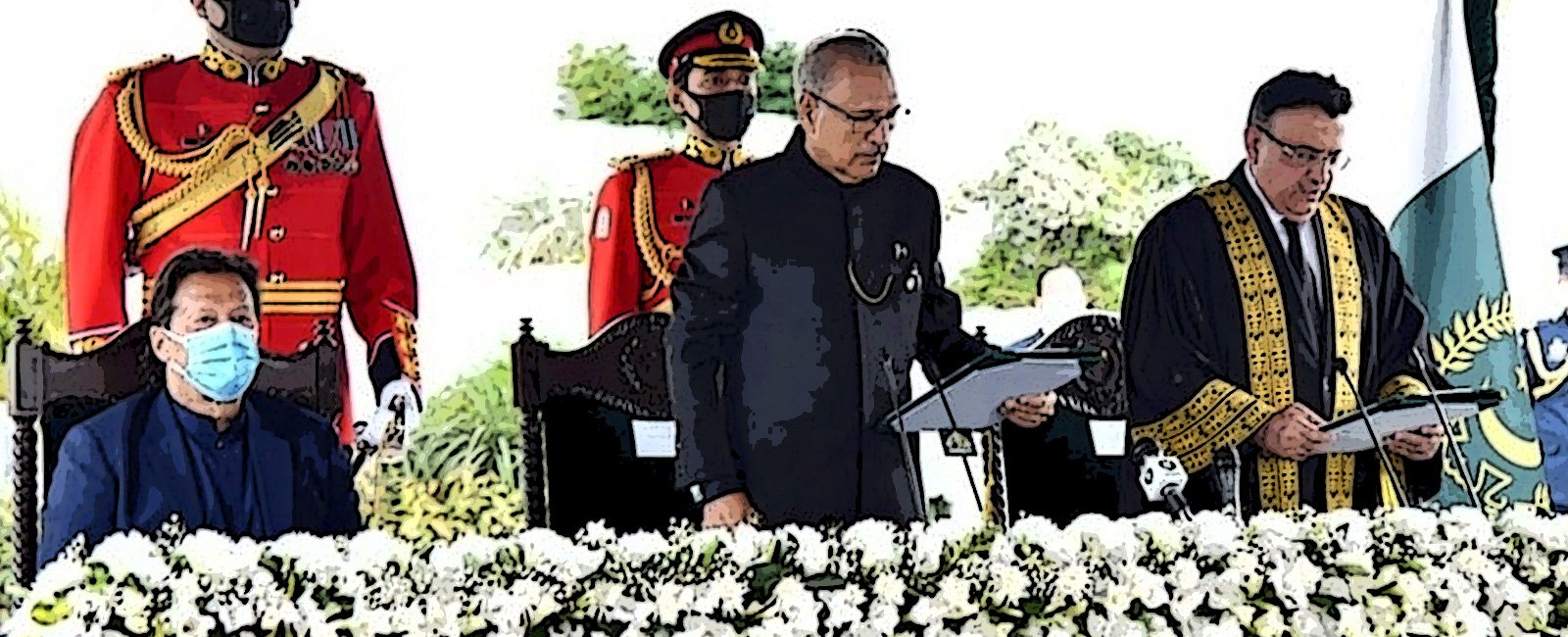CJP Bandial: The judge who ruled politics
A detailed assessment of Chief Justice Umar Ata Bandial's tenure while serving the top judicial post

Today marks the final day in the brief but contentious tenure of Chief Justice of Pakistan, Umar Ata Bandial, who, after his nomination for the country's top-most judicial post took the oath of office on February 2, 2022.
His term as the top apex court judge was loaded with some landmark and other controversial decisions, making him one of the most talked-about chief justices in Pakistan's history.
Following CJP Bandial's departure, senior puisne judge Qazi Faez Isa, hailing from Balochistan, will take over as Pakistan's new chief justice. However, the present chief justice's time in office remains a subject of interest, particularly as he is prepared to bid adieu to the most coveted judicial post in the country tomorrow.
At present, Pakistan's Supreme Court suffers from a crisis of confidence, as its judges, the general populace and politicians have all projected a lack of trust in the institution. The predominant factor behind the issue lies in the judiciary's unfavourable contribution towards Pakistan's current political and economic instability, paralleling the role of the establishment and its favoured politicians.
“Public trust is eroded when the Court is perceived as politically partisan and the judges as ‘politicians in robes’.” — Justice Athar Minallah
During the tenure of the last four chief justices, the Supreme Court has been politically meddled to such an extent that, according to Supreme Court judge, Justice Athar Minallah, “Public trust is eroded when the Court is perceived as politically partisan and the judges as ‘politicians in robes’.”
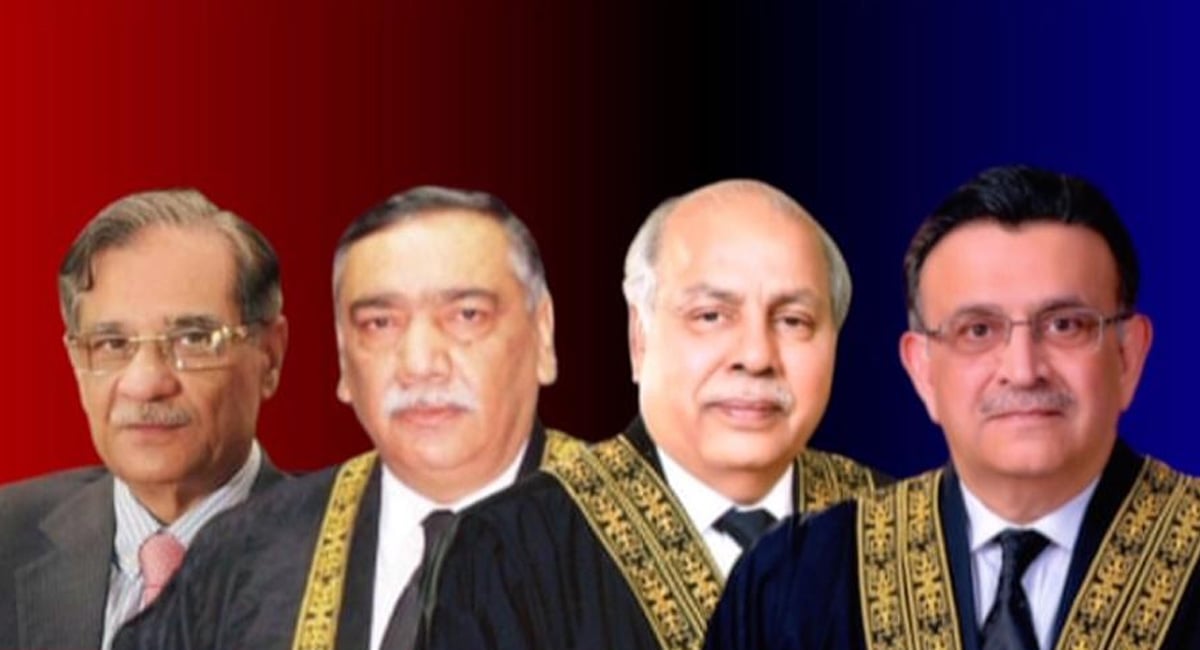
The statement stands true in the current era, as the distinction between judges and politicians has nearly vanished. While former chief justices Saqib Nisar, Gulzar Ahmed, and Asif Saeed Khosa have worked towards eliminating this distinction, the outgoing top SC judge, too, bears significant responsibility in this regard.
Today, CJP Bandial presides over what is considered the weakest and most contentious Supreme Court in the history of democratic governments. It is one where the chief justice himself — despite conflicts of interest — continued to hear a case against the audio leak commission set up to investigate audio leaks, one of which also involved his own mother-in-law. Despite allegations of bias, he delayed the commission's proceedings and even issued a written decision using Quranic verses in his defence.
But the story doesn't end here. CJP Bandial is a unique chief justice in the apex court's history, as his fellow judges have filed charges against him, accusing him of forming favourable benches, running courts through WhatsApp, attempting to rewrite the constitution during his tenure and meddling in parliamentary affairs. He has also been alleged to have sidelined the senior-most judges of the Supreme Court, Justice Qazi Faez Isa and Justice Tariq Masood, both of whom have acknowledged the matter in their respective judicial notes.
Owing to CJP Bandial's tempestuous term in office, Geo News has conducted a detailed assessment, to reflect upon his doings while being seated at the country's most prestigious judicial post.
‘Short and sweet’: CJP Bandial’s final NAB amendments verdict
Just a day before the completion of his tenure, a three-member bench — headed by the chief justice — issued a decision on the petition filed by former prime minister and Pakistan Tehreek-e-Insaf (PTI) Chairman Imran Khan to nullify the 90% amendments made to the National Accountability Bureau (NAB) law by the previous Pakistan Democratic Movement-led government to regulate it. This decision to declare NAB amendments “null and void” was issued by a 2-1 majority, with CJP Bandial and Justice Ijazul Ahsan writing the majority decision and Justice Mansoor Ali Shah dissenting.
The decision could have significant repercussions for political parties in the country. While the Pakistan Tehreek-e-Insaf (PTI) apparently received major relief, the ruling could affect the former ruling coalition including the Pakistan Muslim League-Nawaz (PML-N) and the Pakistan Peoples’ Party (PPP), as many cases against politicos associated with these parties had come to an end after the new NAB amendments. They may now, however, be revived.
Political pundits believe that CJP Bandial's decision, just a day before his retirement, was a subtle message to both political parties who had exerted legal and political pressure during his tenure. The key question remains how legally sound this last-minute masterstroke by the chief justice will prove to be in the context of his tenure.
Its actual ramifications may only become evident later, particularly if a plea for reconsideration against this judgment surfaces. Such an appeal would then be transmitted to the new chief justice, Justice Isa, who initially cast doubt on CJP Bandial's impartiality.
Subsequently, these matters became so intensely contested that they resulted in a clear division within the judiciary during CJP’s entire tenure.
Tracing the military, CJP Bandial and Justice Isa trajectory
The first significant dispute of the serving chief justice arose when a bench he presided over discussed an investigation into Justice Qazi Faez Isa through a presidential reference, involving the establishment and the PTI chief. The reference led to allegations that were subsequently referred to the Federal Board of Revenue (FBR).
His final controversy, however, revolved around the formation of a bench to address issues related to military courts. In this case, two senior Supreme Court judges, including Justice Isa, declared the bench's constitution as illegal. This dispute deepened the existing divisions within the country's top court, splitting it into two distinct factions. The clash also brought the government and the SC into direct confrontation, leading to debates about the need to curb the immense powers vested in the country's top judge.
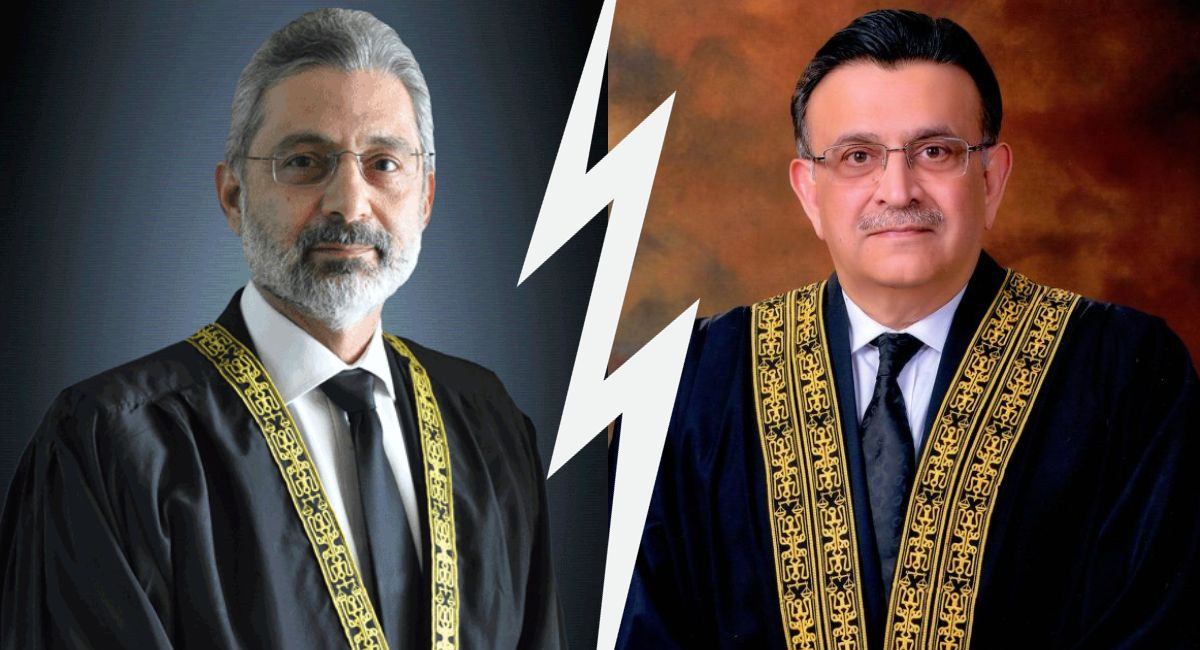
What's particularly intriguing is that this dispute did not originate during the hearing of the military courts' case; it actually began three years ago.
When former chief justice Gulzar Ahmed was abroad, Justice Umar Ata Bandial took the oath as the country's acting top judge on August 20, 2021. Interestingly at the time, his oath was administered by Justice Isa. This was the time when Lieutenant General Faiz Hameed, the then-director-general of the Inter-Services Intelligence (ISI) of Pakistan, was accused of influencing judicial proceedings, and Justice Isa was seen as a target of the establishment.
Surprisingly, CJP Bandial, a day after taking the oath in place of Justice Gulzar, delayed the proceedings of the suo motu notice by Justice Isa on August 21, 2021, in response to journalists' requests. The notice was taken on the day Bandial took oath. As the acting top judge, he then formed a larger bench to oversee the entire matter. The decision regarding the notice also determined his future in the apex court.
In this larger bench, CJP Bandial was joined by Justice Ijaz ul Ahsan, Justice Munib Akhtar, Justice Qazi Muhammad Amin Ahmed and Justice Muhammad Ali Mazhar.
The bench subsequently deemed the suo motu taken by Justice Isa as incorrect and also limited all these powers to the chief justice, which ultimately benefitted none other than CJP Bandial himself.
Thus, the conflict between Chief Justice Umar Ata Bandial and Justice Isa escalated. Then, this year on March 29, Justice Isa and Justice Qazi Ameenuddin issued a ruling regarding the SC's suo motu powers, stating that hearing of all cases under Article 184(3) should be suspended until the Supreme Court first makes its rules.
Suddenly in the next month, the government enacted the Practice and Procedure Act for the Supreme Court. This law divided the chief justice's suo motu powers and the authority to constitute benches between the country's top judge and two senior judges so that a decision is not solely based on the chief justice's whims in the future and a committee comprising the chief justice and the other two senior judges of the Supreme Court would make the decision.
However, even before the president's approval, the CJP Bandial had already formed an eight-member bench under his own leadership, which suspended the enforcement of the act.
Interestingly, the case regarding the division of the chief justice's suo motu powers under the law is still pending, but the law itself is suspended.
Following this matter, the SC formed a nine-member bench, surprisingly including judges like Justice Sardar Tariq Masood and Justice Isa, to hear petitions related to military trials of civilians, including those pertaining to the PTI chairman. Initially, these judges were not included in benches hearing important and politically sensitive cases.
However, Justice Isa and Justice Masood raised objections on this bench, stating that they were not consulted on the matter and that decisions regarding the chief justice's suo motu powers and the formation of benches should be made in accordance with the SC’s Practice and Procedure Act.
Following this, CJP Bandial constituted a new seven-member bench for the matter, which did not include Justice Masood and Justice Isa, but included Justice Yahya Afridi and Justice Mansoor Ali Shah. However, the government objected to Justice Shah's name, claiming that he was related to ex-CJP Jawad S Khawaja, who had submitted the application.
In the wake of this objection, Justice Shah voluntarily recused himself from the bench and expressed his reservations regarding joining the bench. He pointed towards the consistent pattern of benches being formed in the recent past and the reluctance to form a full court. The SC judge also wrote about special benches established, comprising some esteemed judges.
Justice Shah mentioned that due to the absence of a full court, the authority and legality of decisions of the apex court, in some of the most important cases, have been affected.
"I am of the opinion that until this Court decides the constitutionality of the Supreme Court (Practice and Procedure) Act 2023, Section 3 of which has prescribed the procedure for invoking original jurisdiction of this Court under Article 184(3) of the Constitution, all such matters under this jurisdiction must be heard by the Full Court Bench of this Court," the judge wrote in his note.
However, Chief Justice Bandial disregarded the reservations of his fellow judges and continued the practice of forming special benches. In the case of military courts, Justice Yahya Afridi, who is still part of this bench, wrote in favour of constituting a full court in his note after the initial hearing.
However, his request was also disregarded and the case's hearing continued.
CJP Bandial and his benches
The most important point to note is that neither the chief justice himself — who was part of special benches both before and after assuming the top post and continued to hear politically sensitive cases — nor his like-minded judges, who were part of these benches could defend the decisions made by them.
Let us review some facts in this context.
The Supreme Court, in April 2018, issued a controversial decision to completely halt former prime minister Nawaz Sharif's political career. According to the decision, a person disqualified under Article 62(1) (f) of the Constitution would remain disqualified for life. The bench that issued this controversial decision included ex-CJP Saqib Nisar, now CJP Bandial, Justice Azmat Saeed, Justice Ahsan and Justice Ijaz Ahmed Chaudhry.
Similarly, the Supreme Court issued another controversial decision related to the creation of funds for the Diamer Basha and Mohmand Dams in July 2018. The bench that issued this decision included ex-chief justice Nisar, CJP Bandial, Justice Ahsan, and Justice Akhtar.
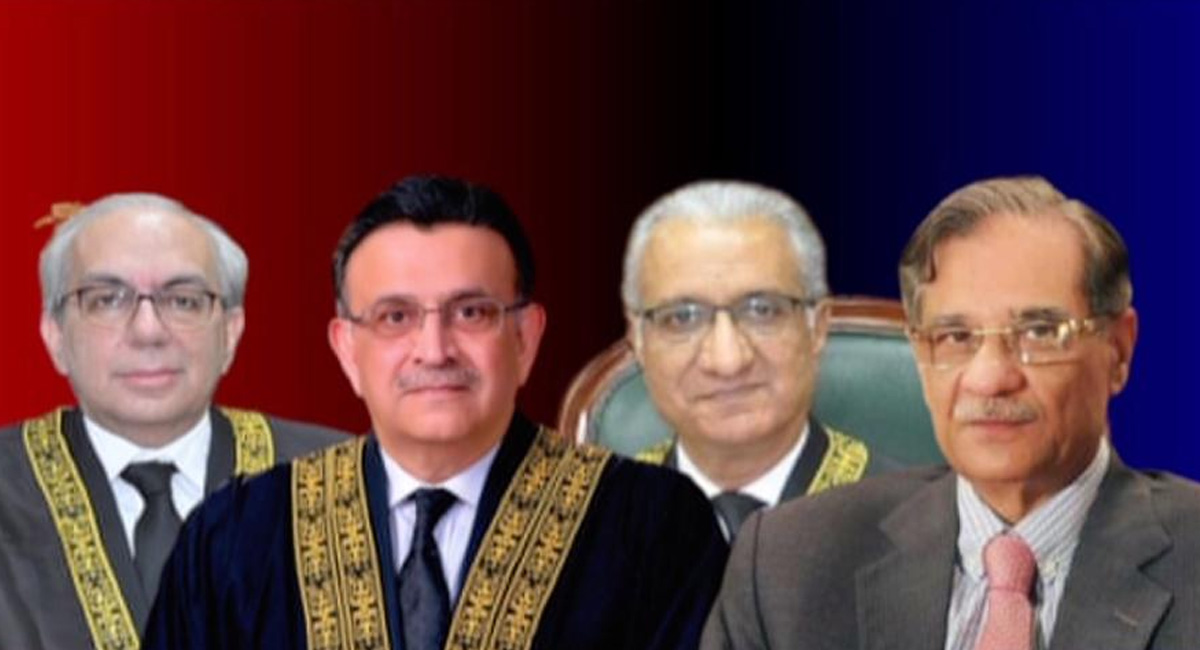
In 2017, the Supreme Court declared Imran Khan sadiq and ameen (honest and trustworthy) in its judgment. The judges involved in this decision included ex-chief justice Nisar, CJP Bandial and Justice Faisal Arab.
In addition, a plea was filed regarding the disqualification of Zulfi Bukhari, a close associate of former premier Khan, in December 2018. However, the SC — comprising then-CJP Nisar, serving Chief Justice Bandial and Justice Ahsan in the bench — rejected this petition.
Another bench — involving the serving chief justice, as well as Justice Ahsan, Justice Akhtar, Justice Ahmed, and Justice Muhammad Ali Mazhar — decided that only the chief justice could use suo motu jurisdiction of the SC in a verdict issued in August 2021.
In March 2021, a presidential reference was filed seeking the Supreme Court’s opinion regarding whether senate elections should be held through secret ballot or open ballot in accordance with the Constitution. While the SC ruled in favour of senate polls to be conducted through secret ballot, the verdict carried a dissenting note from Justice Gulzar, CJP Bandial, Justice Ahsan, Justice Mushir Alam and Justice Afridi. However, Justice Afridi disagreed with the majority decision and sent the presidential reference back.
Similarly, in April 2022, the Supreme Court declared the dissolution of the National Assembly unconstitutional, and the bench included Justice Bandial, Justice Ahsan, Justice Mazhar Alam Miankhel and Justice Jamal Khan Mandokhail.
The SC, in May 2022, took suo motu notice of government interference in the prosecution branch and formed a bench to address the issue. The bench included CJP Bandial, Justice Ahsan, Justice Akhtar, Justice Sayyed Mazahar Ali Akbar Naqvi, and Justice Mazhar.
Another presidential reference was filed in May 2022, seeking the SC's opinion on whether votes cast against party lines should be invalidated or counted. The apex court issued a unique decision on this matter, stating that votes cast against party lines should be invalidated. The bench that issued this decision comprised CJP Bandial, Justice Ahsan, and Justice Akhtar, while Justice Miankhel and Justice Mandokhail dissented and suggested that the decision equates to rewriting the Constitution.
In May 2022, the PTI was taken to court for not complying with the SC's orders regarding protests at D-Chowk. Contempt of court proceedings were initiated against the PTI chief, but the bench — which included CJP Bandial, Justice Ahsan, Justice Akhtar, Justice Naqvi and Justice Afridi — cleared Imran Khan of contempt.
Justice Afridi, on the other hand, expressed that former premier Khan could be charged with contempt; however, the rest of the bench disagreed with him and the case remains unresolved to date.
In July 2022, the SC annulled the ruling of Punjab deputy speaker and recognised the votes cast in favour of Parvez Elahi against the party line, and declared him as provincial chief minister. The bench included CJP Bandial, Justice Ahsan and Justice Akhtar.
In March 2023, the apex court took suo motu notice to set the election dates in Punjab and Khyber Pakhtunkhwa (KP) and formed a bench — comprising CJP Bandial, Justice Ahsan, Justice Mazhar, Justice Naqvi, Justice Mandokhail, Justice Afridi, Justice Shah and Justice Athar Minallah — to address the issue.
In April 2023, the SC overruled the Election Commission of Pakistan's decision to set the election date until October 2023 and fixed the date of elections in Punjab by itself on May 14, which the government did not implement. The bench that issued the decision comprised CJP Bandial, Justice Ahsan and Justice Akhtar.
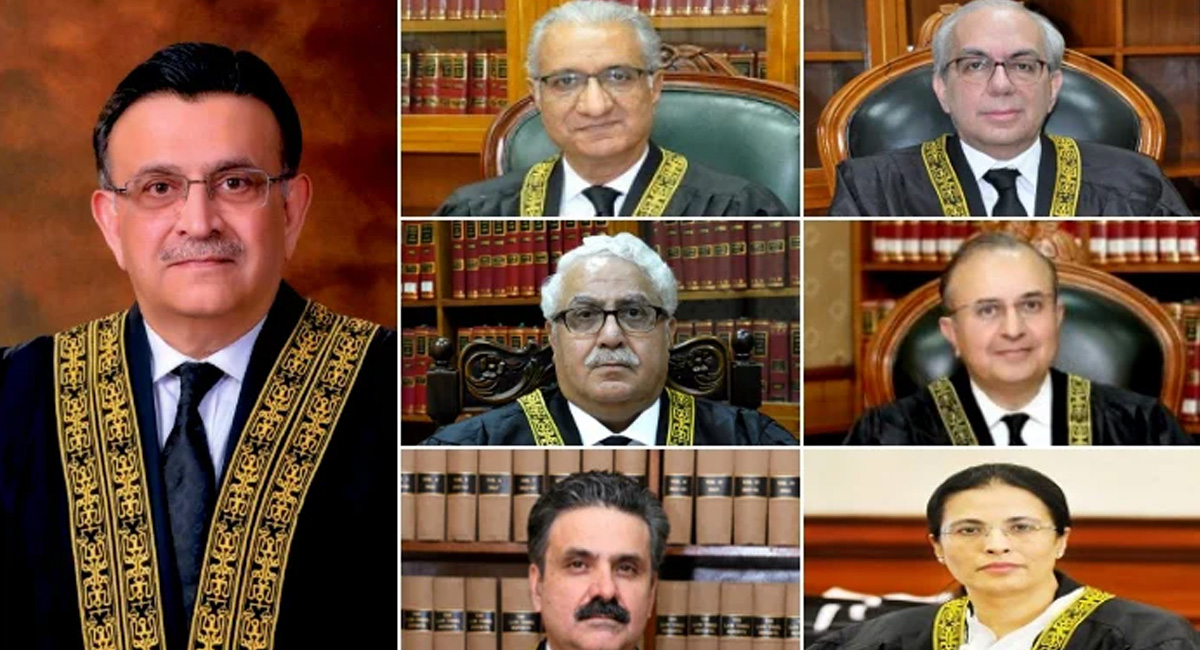
The Supreme Court, in April this year, declared the former prime minister Shehbaz Sharif-led government's Supreme Court (Practice and Procedure) Bill, 2023 "unconstitutional" with CJP Bandial, Justice Ahsan, Justice Akhtar, Justice Naqvi, Justice Ayesha Malik, Justice Hassan Rizvi, and Justice Shahid Wahid on the bench.
The same month, the SC issued a decision asking political parties to fix an agreed election date through dialogue. The bench that issued the order comprised the chief justice, Justice Ahsan and Justice Akhtar.
In May 2023, an apex court bench — headed by CJP Bandial and comprising Justice Ahsan, Justice Akhtar, Justice Rizvi and Justice Waheed — declared the Justice Isa-led audio leaks commission as unconstitutional.
In June 2022, the top court reserved its verdict on a set of petitions challenging the Supreme Court (Review of Judgements and Orders) Act 2023, which was announced on August 11 — just two days after the dissolution of the National Assembly. The bench that declared the law unconstitutional comprised CJP Bandial, Justice Ahsan and Justice Akhtar.
Supreme Court in CJP Bandial’s term
It is also worth noting that out of the 17 judges of the Supreme Court, specific judges have been more frequently seen on benches. These judges include the CJP himself as well as Justice Ahsan and Justice Akhtar.
According to a recent investigation published by The News assessing cases overseen by the Supreme Court in the last four tenures of chief justices, Justice Ahsan had heard 63 cases from the 134 crucial political cases — the most among the 1,957 total reported cases in the past seven years. Justice Bandial heard 52 cases, Justice Munib Akhtar 22 and Justice Isa was part of 11 cases heard at the apex court.
Additionally, of the 1,823 non-significant political cases, Justice Ahsan heard 372 — the highest number of cases — followed by CJP Bandial with 315 cases, Justice Shah 302 cases, Justice Masood 241 cases, while Justice Isa took up 199 cases.
Therefore, CJP Bandial, Justice Ahsan, and Justice Akhtar are the leading Supreme Court judges who have been making decisions on the most significant political cases for the past seven years, while the senior-most judges lag behind.
“Article 62(1)(f) is a draconian provision... this case will be heard with utmost care”. — Chief Justice Umar Ata Bandial
It is important to highlight that some of the decisions made by these benches do not allow the people affected by them to defend themselves. For instance, CJP Bandial heard a case about the disqualification of former PTI leader Faisal Vawda under Article 62-1(f) in October 2022. During the hearing, the chief justice remarked: “Article 62(1)(f) is a draconian provision... this case will be heard with utmost care."
It is intriguing that while CJP Bandial himself wrote the decision to disqualify any public office holder under Article 62(1)(f), he later labelled the law “draconian” when it was applied to the then-PTI leader.
Furthermore, when the possibility of a no-confidence motion against the PTI chairman was approaching, and his party members were defecting, President Arif Alvi sent a presidential reference to the Supreme Court to clarify Article 63 concerning defections. In May 2022, a five-member bench of the Supreme Court gave a 2-3 decision on the said presidential reference, ruling that the votes of defected party members should not be counted.
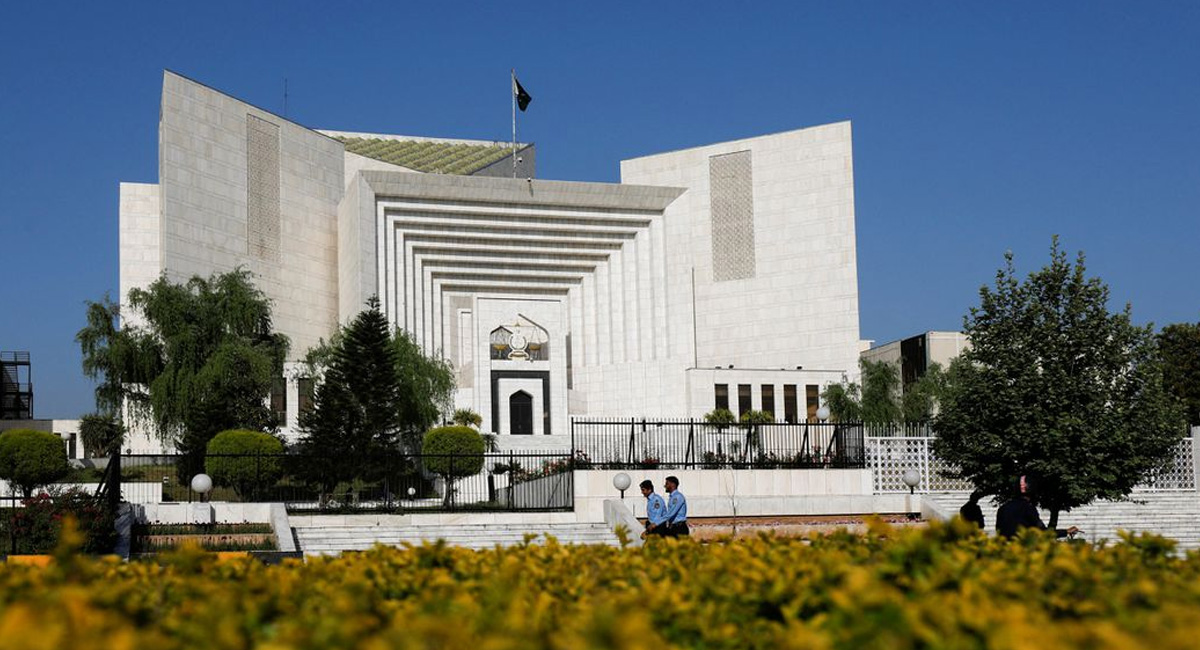
Later, CJP Bandial, who had previously decided not to count the votes of defected members, remarked in their favour on March 24, 2022, during the hearing of the presidential reference.
“It is contemptuous to let a member cast their vote and then say it will not be counted; the vote will be counted no matter what. What to do with it will be decided after the vote count,” he said.
The chief justice and his like-minded judges, over time, introduced new legal justifications and made new decisions that not only impacted the credibility of the Supreme Court but also had a profound negative impact on the country's politics.
During CJP Bandial's term in office, there was one verdict due to which the Supreme Court's intervention became a significant example. It was the first time that apex court judges stood divided, with four on one side and three on the other — both divides claiming their authority over the decision. This case raised questions about who had the majority decision in the end.
While it could not conclusively be established whether who had the majority decision in that case. But CJP Bandial not only lost his standing within his own court but also faced the then-government’s resistance.
This year, Justices Ahsan and Naqvi heard the case pertaining to the suspension of the Lahore Capital City Police Officer (CCPO) Ghulam Mahmood Dogar on February 16. Suddenly, there was concern about the possibility of delayed elections in Punjab, after which the matter was referred to the chief justice for suo motu consideration.
On February 22, CJP Bandial took suo-motu notice of Justice Ahsan and Justice Naqvi's notes and formed a nine-member bench under his leadership. The bench also comprised Justice Ahsan, Justice Shah, Justice Akhtar, Justice Afridi, Justice Naqvi, Justice Mandokhail, Justice Mazhar and Justice Minallah.
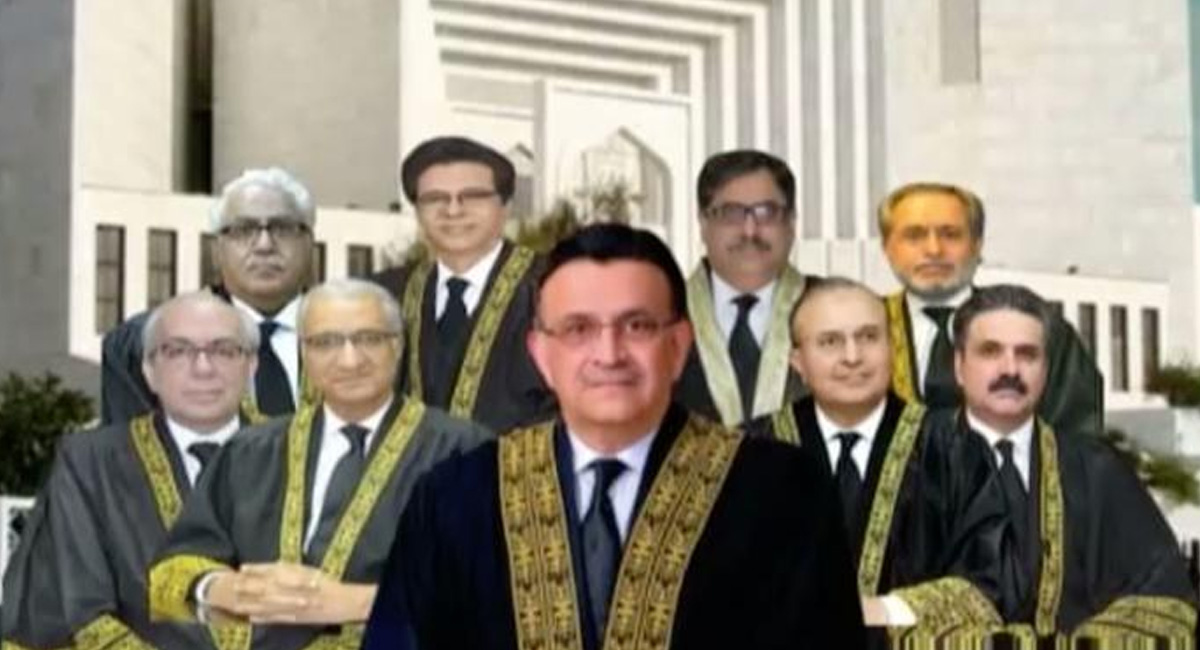
When hearing of the case began on February 24, the PML-N, PPP and Jamiat Ulema-e-Islam-Fazl expressed reservations against Justice Ahsan and Justice Naqvi, demanding their recusal. Consequently, the judges recused themselves from the bench. Later, Justice Afridi also refused to hear the case and excluded himself from it.
CJP Bandial, along with Justice Akhtar and Justice Mazhar, issued an order to hold elections in Punjab on May 14 this year. But the remaining two judges of the bench, Justice Shah and Justice Mandokhail, dissented and rejected the petitions. Justice Afridi and Justice Minallah had noted in their orders that the majority decision to reject the petitions was by a 4-3 ratio, and this was the binding decision.
In contrast, Justice Minallah had noted in his order, agreeing with the decisions of Justice Shah and Justice Mandokhail.
“I have had the privilege of reading the detailed reasoning recorded by my learned brothers, Syed Mansoor Ali Shah and Jamal Khan Mandokhail, JJs and I agree with their opinion, particularly regarding the final outcome of the petitions and the suo motu assumption of jurisdiction by a majority of 4 to 3 because this was the understanding in the meeting held in the anteroom on 27.02.2023. It is noted that I had not recused nor had any reason to dissociate myself,” he wrote in his note.
Therefore, CJP Bandial, in his capacity as the SC top judge, asserted that the majority decision belonged to their faction, whereas the four remaining judges maintained their claim to it. Consequently, the judges were removed from their duties on the bench without prior notification.
Consequently, the conflict further exacerbated the Supreme Court’s reputation to such an extent that political leaders openly avowed their unwillingness to acknowledge its verdicts. It is now pivotal to observe whether Justice Isa can restore the credibility of the Supreme Court by reversing these trends or not once he assumes the coveted seat of Pakistan’s chief justice.
Wajid Baloch is a staffer at Geo News



